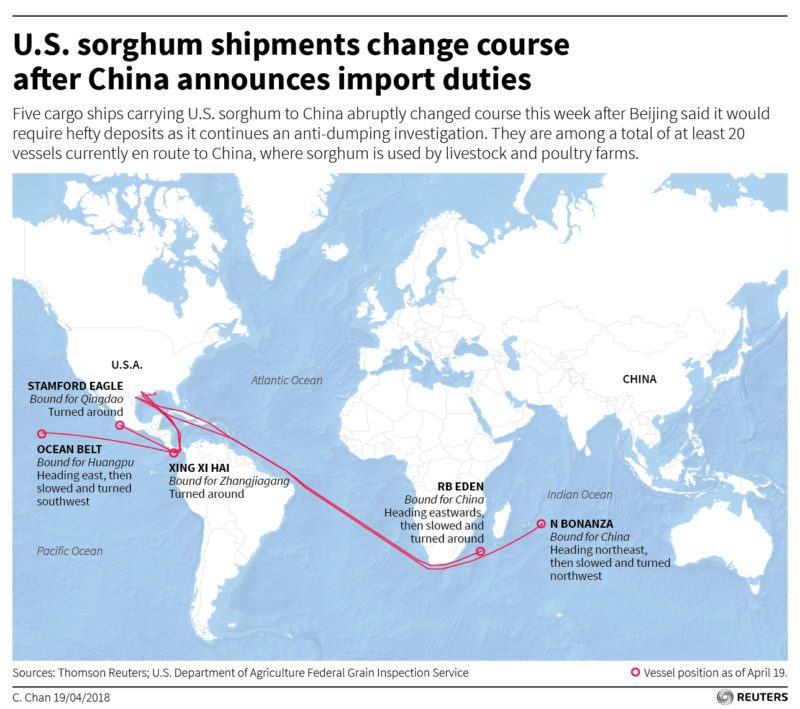Major Cocaine Bust: UK Border Force Seizes Record Shipment at London Gateway
In one of the UK’s largest drug seizures of the past decade, UK Border Force officers have seized cocaine with an estimated street value of £96 million (USD 130 million)...

Photo: Shutterstock/Volodymyr Kyrylyuk
![]() By Karl Plume and P.J. Huffstutter CHICAGO, April 19 (Reuters) – Several ships carrying cargoes of sorghum from the United States to China have changed course since Beijing slapped hefty anti-dumping deposits on U.S. imports of the grain, trade sources and a Reuters analysis of export and shipping data showed.
By Karl Plume and P.J. Huffstutter CHICAGO, April 19 (Reuters) – Several ships carrying cargoes of sorghum from the United States to China have changed course since Beijing slapped hefty anti-dumping deposits on U.S. imports of the grain, trade sources and a Reuters analysis of export and shipping data showed.
Sorghum is a niche animal feed and a tiny slice of the billions of dollars in exports at stake in the trade dispute between the world’s two largest economies, which threatens to disrupt the flow of everything from steel to electronics.
The supply-chain pain felt by sorghum suppliers on the Pacific, Atlantic and Indian oceans underscores how quickly the mounting trade tensions between the U.S. and China can impact the global agricultural sector, which has been reeling from low commodity prices amid a global grains glut.
Twenty ships carrying over 1.2 million tonnes of U.S. sorghum are on the water, according to export inspections data from the USDA’s Federal Grain Inspection Service. Of the armada, valued at more than $216 million, at least five changed course within hours of China’s announcing tariffs on U.S. sorghum imports on Tuesday, Reuters shipping data showed.

The five shipments, all headed for China when they were loaded at Texas Gulf Coast export terminals owned by grain merchants Cargill Inc or Archer Daniels Midland Co would be liable for a hefty deposit to be paid on their value, which could make the loads unprofitable to deliver.
Beijing, which is probing U.S. imports for damage to its domestic industry, announced Tuesday that grains handlers would have to put up a deposit of 178.6 percent of the value of the shipments.
Traders said Cargill and ADM likely sold most of the grain in the cargoes that are on the water, traders said.
In a statement to Reuters on Thursday, Cargill confirmed it is the exporter. The company declined to confirm what is in the ships, the final destinations or the tonnage, nor name the customers. The company also declined to confirm why the ships stopped, or if they are being re-directed – but said that it does not have any responsibility for costs that may result.
ADM representatives declined to comment.
The Panamanian-flagged ship called the N Bonanza, was churning its way northeast across the Indian Ocean earlier this week, carrying more than 67,000 tonnes of sorghum from ADM’s elevator in Corpus Christi, Texas, according to Reuters shipping data.
Eleven hours after the anti-dumping deposits were announced, the ship stopped and then slowly tracked northwest.
The RB Eden, a vessel carrying 70,223 tonnes of sorghum loaded at the same ADM terminal, was headed east-northeast through the Indian Ocean off the coast of South Africa. It turned around.
Hours later, the Stamford Eagle – hauling sorghum from Cargill’s elevator in Houston – turned around off the western coast of Mexico.
At least two other vessels have also suddenly changed course: the Ocean Belt and Xing Xi Hai, both loaded at Cargill’s terminal.
It is unclear where the vessels are now heading.
For now, at least, two of the world’s largest grain merchants are among those feeling the impact of the latest trade tussle with China, even if it is just a short-term issue, said Bill Densmore, senior director of corporate ratings at Fitch Ratings.
“For their overall trade businesses, this is not that substantial. But it’s a warning,” Densmore said. “If China really does start slapping tariffs on everything, like soybeans and corn, things could get really ugly, really fast.”
Beijing’s move has heaped more strain on an already tense trade relationship between the world’s two largest economies.
Traders said the deposit was high enough to bring U.S. imports to a halt. Sorghum is used in livestock feed and the fiery Chinese liquor baijiu.
Indeed, the news had an immediate impact on the global grains market: Bids for cargoes of Australian sorghum, which are not subject to the higher tariffs, spiked following the announcement, traders said.
Industry sources in China said some of the cargoes might be redirected to Southeast Asian countries, such as Vietnam and the Philippines, to feed hog and poultry plants owned by Chinese feed producers.
However, those countries and others in the region are small importers of sorghum. Vietnam has never imported U.S. sorghum and the Philippines imported just 19,000 tonnes in the 2016/17 season, according to USDA data.
China, by contrast, imported more than 5.2 million tonnes last season, nearly 10 times more than No. 2 importer Japan, the data showed.
Shippers may have to discount the cargoes to sell them, analysts said.
“They’re not in a strong bargaining position considering they’ve got shipments from across the ocean that they have to sell and get the boats cleared out,” said economist Daniel O’Brien of Kansas State University in the top U.S. sorghum-producing state.
Sorghum prices at the Texas Gulf have slipped since China’s announcement. At midweek, immediate shipments from Corpus Christi were priced around $181.29 per tonne, not including shipping costs, a one-month low.
The U.S. sorghum industry called for an end to the trade dispute and expressed concern about the impact on established trade relationships that have taken years to build.
“This tit for tat has to stop, and talks to find reasonable and lasting solutions must begin, for the good of U.S. agriculture and the customers we have spent decades working to win as loyal buyers,” said Tom Sleight, president and CEO of the U.S. Grains Council.
(Reporting by Karl Plume and P.J. Huffstutter; Additional reporting by Theopolis Waters and Michael Hirtzer in Chicago and Hallie Gu in Beijing Editing by Simon Webb and Lisa Shumaker)
(c) Copyright Thomson Reuters 2018.

Sign up for gCaptain’s newsletter and never miss an update

Subscribe to gCaptain Daily and stay informed with the latest global maritime and offshore news


Stay informed with the latest maritime and offshore news, delivered daily straight to your inbox
Essential news coupled with the finest maritime content sourced from across the globe.
Sign Up